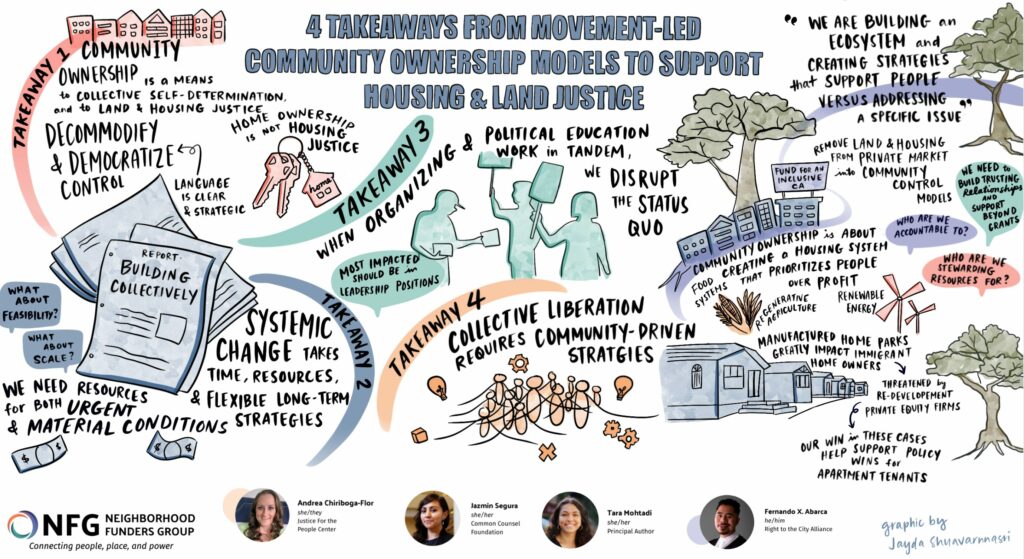The Democratizing Development Program (DDP) organizes funders to ensure all people live in a safe, affordable home. In the fall, DDP hosted a webinar that invited funders to examine how the economy’s housing system prevents people from living in dignified homes and the solutions that grassroots, power building organizations are creating. This article highlights three lessons from that discussion and how funders can center the needs of their grantees and support shared ownership of land and resources for multiracial working class communities.
Philanthropic Strategy Should Reflect the Time it Takes to Build Power
Our country’s history of racial capitalism functions so that a select few increasingly profit from the labor, land and natural resources that we all rely on. Centuries of cultural norms around ownership, laws, zoning codes, restrictive deeds, land-use decisions create powerful headwinds for everyone to safely live in an affordable home. The policies and cultural norms of racial capitalism are context-specific, thereby requiring coalitions that are nimble and powerful enough to implement community-driven solutions strong enough to combat history.
For Justice for the People in Colorado, ensuring their members all have safe, affordable homes means that their members, who are predominantly Latine, Indigenous, and immigrants, organize for robust tenant protections and fundraise to purchase the land where their housing resides. New developments are typically built where land is the cheapest. For members of Justice for the People, that means that residents of manufactured housing (i.e. mobile home parks) are most at risk of displacement. Anti-displacement policies become prerequisites to building wealth in this context. The work to secure policy support for tenant protections and community ownership spanned over ten years. At every point, the organization faced opposition; including but not limited to: misinformation about who the housing will support, electoral opposition from lobbyists, xenophobic media narratives, and intimidation by property managers and developers. Multi-year general operating grants enable groups to do this type of work year-round. Still more is needed. Funders should create strategies that match the decades of organizing this work takes. To create those strategies, funders should invite movement partners early, meaningfully, and often to design grantmaking principles.
Redefine Success to Match the Strategic Outcomes of Grantees
During the call, Jazmin Segura described how movement partners that govern the grantmaking at Common Counsel Foundations implement strategies to navigate setbacks and deliver wins even in places historically oppositional to resident power and self-determination. At Common Counsel Foundation, the Fund for an Inclusive California (F4IC) was launched after learning with movement partners and assessing the gaps in the philanthropic funding landscape. Their assessment identified that philanthropy had been supporting state level policy reform for housing production while communities were not involved in deciding how to address the immediate housing crisis. Moreover, policy solutions promising to build affordable housing years down the road did not prevent displacement from redevelopment efforts that favor the needs of wealthy and income-agile communities. By inviting grantees early in the process to design grantmaking strategies, F4ICA supported material changes in people’s lives and secured buy-in from more funders and resource statewide powerbuilding. Their partnership with movement also informed the launch of a fund designed to provide integrated patient capital to community ownership models. That fund, the Community Ownership for Community Power Fund, is also guided by power building and organizing groups who see their role in creating a housing system that removes incentives to evict tenants, inflate housing costs, and build more housing for working class communities.
Systemic reform requires that philanthropy fund organizing and power building for working class communities to shift the cultural and policy conditions that are necessary to erode racial capitalism. Power is essential in this context. The power that Common Counsel’s grantees are building seeks to create a future where neighborhoods are safe and healthy, food systems are sustainable and locally-driven, workers retain wealth from their labor through cooperatives, culture workers can afford to live where they work, and energy demands are renewable. In order to successfully achieve those goals, Jazmin called on funders to practice disciplined commitment to the narratives and long-term goals of grantees is essential to prevent early concessions that erode momentum towards movement success. This could look like funding groups that are seeking to do more housing justice work or groups that want to work with new constituencies. As the national landscape shifts, state and local governments may acquiesce to the demands of industries that are profiting from the housing crisis. Funding leadership development, mutual aid, and base building are essential to counter balance private and corporate interests from exacerbating the status quo.
Share Learning, Scale Ideas, and Move Money
Organized capital is overstretching movement groups and heightening attacks on tenants, immigrants, formerly incarcerated people, and working class communities. In order to resist the backsliding towards more corporate control of the economy, learning and coordination led by national movement networks, such as Right to the City Alliance (RTTC), prevents groups from recreating the wheel. Fernando (Fer) Xavier Abarca organizes integrated, investment capital at Right to the City. Fer and his team provide space for sharing experiences and resourcing organizations that are seeking to remove land and housing off the speculative market. While there are policy and cultural obstacles to decommodifying housing, community controlled funds such as these make housing more affordable, provide non-extractive capital and enable movement groups to participate in the housing economy without complete reliance on resources committed to racial capitalism. RTTC’s fund supports member organizations to create community land trusts, cooperatives businesses and homes, neighborhood trusts, renewable forms of energy, and meet other community needs. They are one fund within an ecosystem of community controlled funds that are addressing crises brought on by the speculation of land and housing.
Philanthropic funding for movement groups to collectively steward land, housing, and pooled funds is inherently intersectional, as movement-led community ownership models will involve a variety of stakeholders. Each speaker highlighted how various constituencies can pursue community ownership models while advancing shared goals to promote quality work, regenerative economies, and systems of community care. The common goal for this work is the importance of building power for tenants, workers, immigrants, and working class communities most impacted. So whether a foundation supports unsheltered communities, tenants, or homeowners indebted to banks, funding can build power for a just housing system. A movement to organize these communities while centering the needs of those most directly impacted requires disciplined commitment from philanthropy. Decades of systemic pushout and prioritization of corporate profit have created conditions where the majority of the country’s housing has been priced above the needs of workers and community members. Only commensurate decades of disciplined resourcing and shared learning with movement groups will undo those conditions.
NFG is committed to continuing learning from movement groups who are engaged in these efforts. Our members and programs offer space for funders to learn how to make the case internally within their institutions and resource groups in the way that supports these growing ecosystems. Please contact Chimene Okere at [email protected] to learn more about ways your foundations can support this critical work.
Posted 11/21/2024 in
Share

